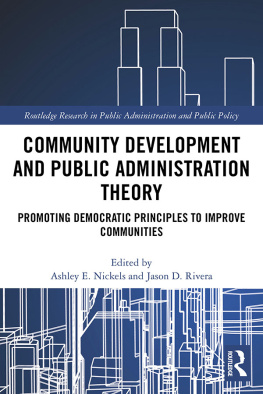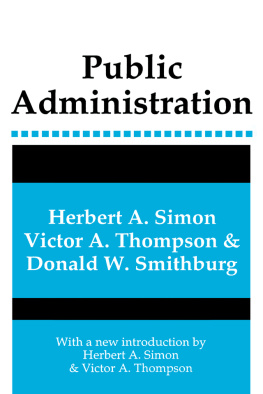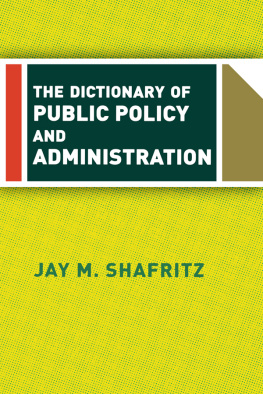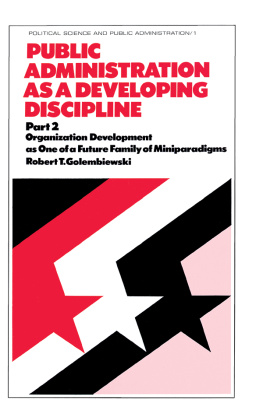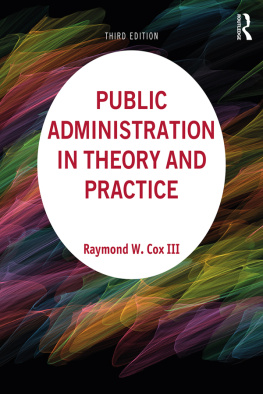PUBLIC ADMINISTRATION EVOLVING
Public Administration Evolving: From Foundations to the Future demonstrates how the theory and practice of public administration has evolved since the early decades of the twentieth century. Each chapter approaches the field from a unique perspective and describes the seminal events that have been influential in shaping its evolution.
This book presents major trends in theory and practice in the field, provides an overview of its intellectual development, and demonstrates how it has professionalized. The range from modernism to metamodernism is reflected from the perspective of accomplished scholars in the field, each of whom captures the history, environment, and development of a particular dimension of public administration. Taken together, the chapters leave us with an understanding of where we are today and a grounding for forecasting the future.
Mary E. Guy is past President of the American Society for Public Administration (ASPA) and a fellow of the National Academy of Public Administration (NAPA). Her research focuses on the human processes involved in public service delivery as well as public administration in general. She has earned a number of awards for her work, including five Best Book Awards for Emotional Labor: Putting the Service in Public Service and Emotional Labor and Crisis Response: Working on the Razors Edge (co-authored with Sharon Mastracci and Meredith Newman).
Marilyn M. Rubin is Professor of Public Administration and Economics at John Jay College of the City of New York, USA and is Director of the Colleges MPA program. She has authored several publications on fiscal policy and budget-related issues and has served as a consultant to municipal, state, federal, and international entities. She is a fellow in NAPA and the winner of a Distinguished Research Award from ASPA.
PUBLIC
ADMINISTRATION
EVOLVING
From Foundations to the Future
Edited by Mary E. Guy and Marilyn M. Rubin
First published 2015
by Routledge
711 Third Avenue, New York, NY 10017
and by Routledge
2 Park Square, Milton Park, Abingdon, Oxon OX14 4RN
Routledge is an imprint of the Taylor & Francis Group, an Informa business
2015 American Society for Public Administration
The right of the editor to be identified as the author of the editorial material, and of the authors for their individual chapters, has been asserted in accordance with sections 77 and 78 of the Copyright, Designs and Patents Act 1988.
All rights reserved. No part of this book may be reprinted or reproduced or utilized in any form or by any electronic, mechanical, or other means, now known or hereafter invented, including photocopying and recording, or in any information storage or retrieval system, without permission in writing from the publishers.
Trademark notice: Product or corporate names may be trademarks or registered trademarks, and are used only for identification and explanation without intent to infringe.
Library of Congress Cataloging-in-Publication Data
Public administration evolving : from foundations to the future / edited by Mary E. Guy and Marilyn M. Rubin.
pages cm
Includes bibliographical references and index.
1. Public administrationHistory. 2. Public administrationPhilosophy. I. Guy, Mary E. (Mary Ellen) editor of compilation. II. Rubin, Marilyn M. (Marilyn Marks), 1940 editor of compilation.
JF1351.P81876 2015
351dc23
2014039393
ISBN: 978-0-7656-4325-4 (hbk)
ISBN: 978-0-7656-4326-1 (pbk)
ISBN: 978-1-315-71895-8 (ebk)
Typeset in Bembo
by Swales & Willis, Exeter, Devon, UK
CONTENTS
David H. Rosenbloom
Public administration differs substantially from private-sector work. It must balance executive, legislative, and judicial demands; embrace federalism; honor constitutional obligations; and advance policy arenas.
Donald F. Kettl
Since the American Society for Public Administrations founding, there has been greater interweaving of the public, private, and nonprofit sectors. This has led to a flatter public bureaucracy with greater challenges for ensuring effective administration and strong accountability.
Chester A. Newland
At the federal level, the practice of public administration through the eras has been punctuated by wars, partisan political swings, changing public opinion, and growing budgetary constraints.
Donald E. Klingner
Market forces, ease of travel, the Internet and electronic communication have created global interdependencies and linkages. These combined to transform the administrative landscape.
Rosemary OLeary
The evolution from scientific management and proverbs of administration to current-day collaborations across agencies and levels of government has progressed slowly but steadily, moving from hierarchy to heterarchy.
Kaifeng Yang
As the field of public administration matured, those dissatisfied with its scholarly direction urged a focus on empirical studies of management. Whether the focus has become a distinction without a difference is debated.
Kathryn E. Newcomer
Performance outcomes have become increasingly important in recent decades, resulting in the focus on outputs giving way to a growing emphasis on impacts and results.
Jooho Lee and B.J. Reed
Advances in information technology have soared in recent decades, changing the way agencies are staffed, the way government communicates with citizens, and the challenges that confront public executives.
Norma M. Riccucci
Expectations of sameness are being replaced by sensitivity to differentness. Topics of changing racial, ethnic, and gender composition of the public service, family-friendly workplaces, and case law are presented.
Susan T. Gooden
The insertion of social equity into the canon of public administration created an important consideration for policies and programs. But social equity has been difficult to operationalize and its implementation uneven.
Jeremy F. Plant
An overview of how the field and its subfields developed, along with a description of the associations that either spun off from the American Society for Public Administration or developed to appeal to parallel constituencies.
James H. Svara
Expectations of public integrity have evolved into a formal code of ethics. The codification of expectations reflects the enduring values of public service as well as the developing emphasis on social equity.
Mary E. Guy and Marilyn M. Rubin
This concluding chapter puzzles over the enduring debates of the field, its continuities, its discontinuities, and the challenges that coming trends present.
Richard Stillman
The fact of the matter is that most of the problems that we now face are administrative problems.
(President John F. Kennedy)
As Ive gotten older, Ive come to realize that the emphasis on public policy is mistaken, and what we should be focusing on is teaching basic public administration.
(Francis Fukuyama)
Sustained inability to provide welfare, prosperity, equity, justice, domestic order, or external security could over time undermine the legitimacy of even democratic governments.
(Samuel P. Huntington)





